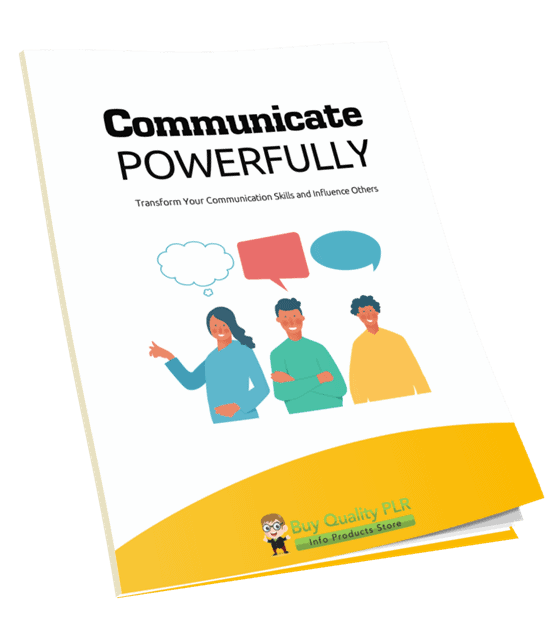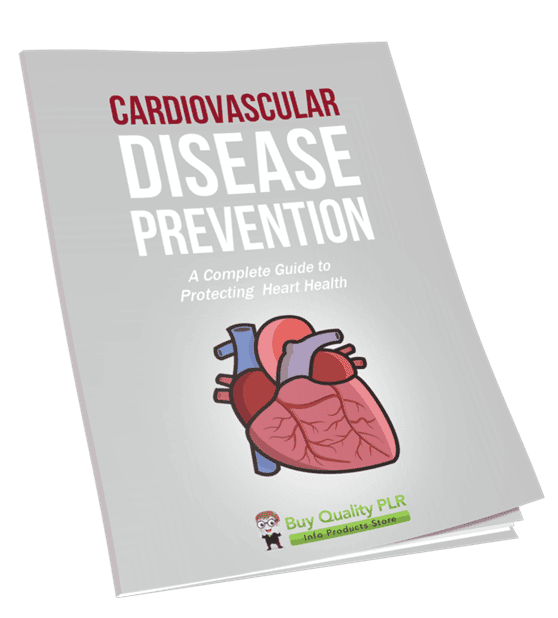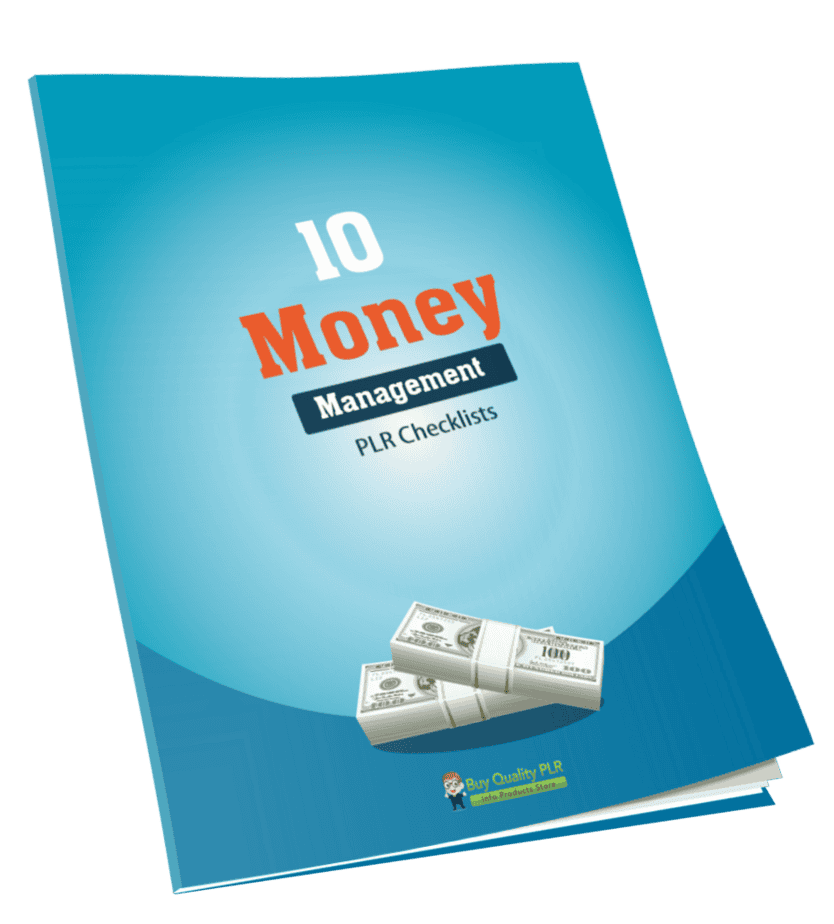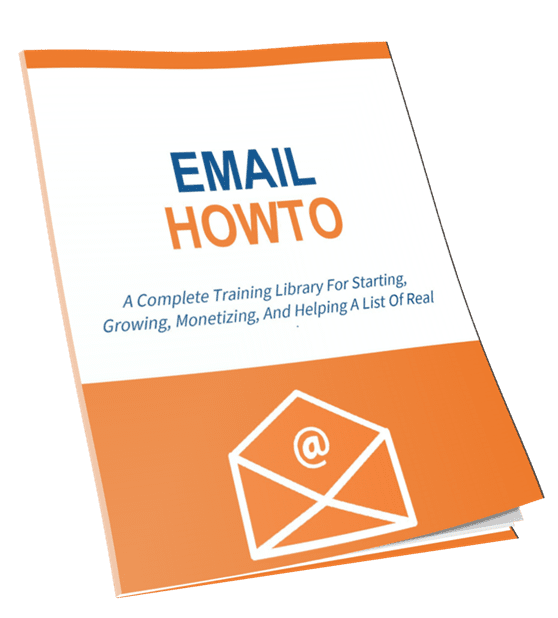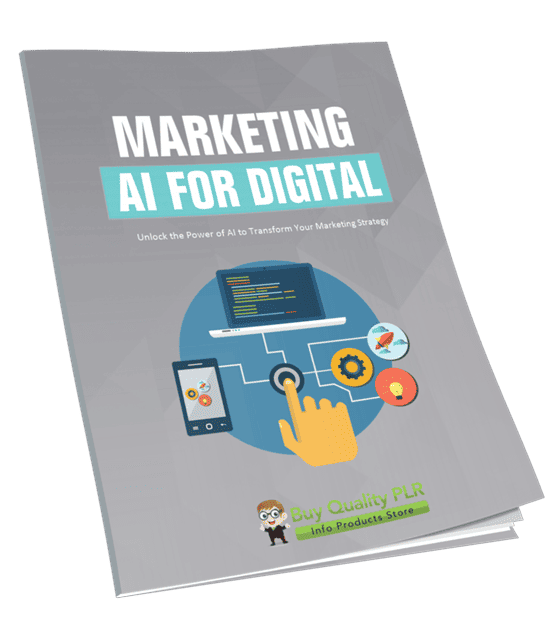
AI for Digital Marketing PLR Course 28k Words
in Artificial intelligence PLR , Artificial Intelligence PLR eBooks , Marketing PLR , Marketing PLR Ebooks , PLR Checklists , PLR eBooks , PLR eCourses , PLR List Building Reports , Premium PLR , Premium PLR eBooks , Premium PLR Reports , Premium White Label Brandable PLR Coaching Courses , Private Label Rights ProductsChoose Your Desired Option(s)
has been added to your cart!
have been added to your cart!
#aimarketing #digitalmarketing #plrcourse #aiformarketing #marketingautomation #contentmarketing #onlinebusiness #marketingstrategy #artificialintelligence #plrcontent
AI for Digital Marketing PLR Course – Unlock the Power of Artificial Intelligence to Transform Your Marketing Strategy
Master AI-Driven Marketing with This Comprehensive, Done-For-You PLR Course – Ready to Resell, Customize, and Share!
Welcome to the AI for Digital Marketing PLR Course! Whether you’re new to AI or looking to elevate your digital marketing efforts, this course will teach you how to harness the power of AI for better automation, enhanced customer engagement, and smarter marketing strategies. With over 26,000 words of expertly crafted content, you’ll be equipped with the knowledge and tools to effectively integrate AI into your marketing campaigns and transform the way you approach digital marketing.
For just $14.99, you gain instant access to this PLR course, which you can sell, rebrand, and use as your own. Whether you’re a marketer looking to leverage AI for growth or an entrepreneur aiming to introduce AI-driven solutions, this course is your gateway to mastering the future of digital marketing.
Presenting…
AI for Digital Marketing PLR Course 28k Words
What’s Included in “AI for Digital Marketing” PLR Course
This PLR Checklists Package offers you everything you need to understand and apply AI to various aspects of digital marketing. From content creation and SEO optimization to social media engagement and email marketing, the course covers it all.
Module 1: Understanding the Basics of AI in Digital Marketing
Objective: Gain a strong foundation in AI and its role in digital marketing.
- Step 1: What is AI and How It Fits into Marketing?
Learn the fundamentals of Artificial Intelligence, its impact on marketing, and how it can automate and improve marketing strategies. - Step 2: Types of AI Tools for Digital Marketing
Dive into the various AI tools available for marketers, including chatbots, predictive analytics, recommendation engines, and content creation tools. - Step 3: Benefits of AI in Digital Marketing
Explore the key advantages of incorporating AI into your marketing efforts, such as enhanced customer experience, improved efficiency, and data-driven insights. - Step 4: How AI is Changing the Role of Digital Marketers
Understand how AI is not replacing digital marketers but rather empowering them to work smarter and focus on more strategic tasks.
Module 2: AI-Powered Content Creation and Optimization
Objective: Learn how to leverage AI for content creation, SEO optimization, and audience engagement.
- Step 1: Using AI for Content Creation
Discover how AI tools can assist you in generating high-quality content for blogs, emails, and social media campaigns, making content creation faster and more efficient. - Step 2: Content Personalization with AI
Learn how AI can analyze user behavior and preferences to deliver highly personalized content to your audience, leading to better engagement and conversion rates. - Step 3: Automating SEO with AI Tools
Master the use of AI-driven SEO tools that help you analyze keywords, optimize your content, and boost your rankings on search engines. - Step 4: Optimizing Content for Better Engagement
Explore how AI can analyze your content’s performance and suggest improvements to make it more engaging and effective.
Module 3: AI-Driven Social Media Marketing
Objective: Discover how AI can improve your social media strategy.
- Step 1: Using AI for Social Media Management
Learn how AI tools can automate scheduling, monitor social media platforms, and analyze audience engagement to streamline your social media management. - Step 2: Chatbots for Customer Engagement
Explore how AI-powered chatbots can help engage with customers, answer their queries, and offer personalized experiences in real time. - Step 3: Social Media Analytics with AI
Leverage AI to gain deep insights into your social media performance, track audience sentiment, and refine your strategies for better results. - Step 4: Predictive Analytics for Social Media Trends
Use AI to predict upcoming trends in your industry, enabling you to stay ahead of the competition and create content that resonates with your audience.
Module 4: AI for Email Marketing
Objective: Learn how AI can supercharge your email marketing efforts.
- Step 1: Automating Email Campaigns with AI
Understand how AI can help you automate email segmentation, scheduling, and personalization to boost open rates and conversions. - Step 2: Personalized Email Content with AI
Discover how AI can create tailored email content based on customer data, ensuring your emails are highly relevant and impactful. - Step 3: AI-Driven A/B Testing for Emails
Learn how AI can automatically test different email elements (such as subject lines and images) and provide insights on what works best. - Step 4: AI for Email List Management
Use AI to clean up and manage your email list by identifying inactive subscribers, ensuring better targeting and improved results.
Module 5: Measuring Success with AI Analytics
Objective: Discover how AI-powered analytics can help track and optimize marketing performance.
- Step 1: Setting Up AI-Driven Analytics Tools
Learn how to set up AI tools to track key metrics, including website visitors, conversions, and more, to gain actionable insights. - Step 2: Using AI for Customer Journey Mapping
Leverage AI to understand the customer journey from awareness to purchase, optimizing each touchpoint for a seamless experience. - Step 3: AI for Predicting ROI
Understand how AI can help predict the return on investment (ROI) of your marketing campaigns by analyzing past data and providing insights. - Step 4: Continuous Improvement with AI Insights
Learn how AI continues to learn from your data, offering ongoing recommendations for improvement to ensure your marketing strategies remain effective.
Bonus Materials Included
- AI for Digital Marketing Checklist (457 Words)
A handy checklist summarizing key steps and tips for using AI in digital marketing, helping you stay organized and on track. - AI for Digital Marketing FAQs (1,010 Words)
Get answers to frequently asked questions about integrating AI into digital marketing and address any concerns you may have. - AI for Digital Marketing Sales Page (647 Words)
A professionally written sales page designed to help you market and sell this AI for Digital Marketing PLR Course effectively.
How to Use and Profit from the “AI for Digital Marketing” PLR Course
You can leverage this PLR Checklists Package in various ways to build your digital marketing business or resell it. Here are a few ideas:
- Direct Sales:
Sell the AI for Digital Marketing PLR Course as-is for $14.99. It’s the perfect resource for digital marketers wanting to integrate AI into their strategies. - Mini-Courses or Reports:
Break the course into smaller, bite-sized modules or reports and sell them individually for $10-$20 each, focusing on specific areas like email marketing or social media. - Bundle with Other Digital Marketing Content:
Combine this course with other digital marketing materials and sell the bundle for $47-$97, offering more value to your customers. - Membership Site:
Use the content to create a membership site where members can access ongoing AI-based digital marketing strategies. Charge a recurring fee for access. - Eclass or Coaching Program:
Transform the content into a multi-week eclass or coaching program, where you can charge $297-$497 to help your customers implement AI in their marketing. - Physical Products:
Convert the course into a physical product like a workbook, planner, or guidebook, and sell it at a premium price. - Lead Magnets and Free Content:
Use excerpts from the course or the checklist as free content or lead magnets to attract more subscribers and build your email list. - Affiliate Program:
Set up an affiliate program and offer up to 75% commission to affiliates promoting your AI for Digital Marketing PLR Course.
License Terms:
- What You Can Do:
You can edit, rebrand, and sell the content. Break it into smaller parts, bundle it with other products, or create derivative products like workshops, videos, or physical goods. - What You Can’t Do:
You cannot pass on PLR rights or resale rights to your customers. The content must be sold and cannot be given away for free. You also cannot offer 100% affiliate commissions (maximum 75%).
Get Instant Access to “AI for Digital Marketing” PLR Course for Only $14.99!
Don’t miss out on this opportunity to master AI for digital marketing and transform your strategies. For just $14.99, you get the complete AI for Digital Marketing PLR Course, full of actionable steps, tools, and resources to take your digital marketing efforts to the next level.
Get started now and unlock the power of AI for your digital marketing success!
has been added to your cart!
have been added to your cart!
Here A Sample of Sustainable Living PLR Course
Welcome to the “AI for Digital Marketing” course! Whether you’re just getting started with AI or you’re looking to take your digital marketing efforts to the next level, this course is here to guide you through the entire process in a simple, friendly, and easy-to-follow way. Let’s dive into the modules and start mastering AI for digital marketing!
Module 1: Understanding the Basics of AI in Digital Marketing
Step 1: What is AI and How It Fits into Marketing?
Welcome to the first step of your journey into the exciting world of Artificial Intelligence (AI) in digital marketing! In this section, we’ll dive into the fundamentals of AI, its core functions, and how it’s revolutionizing digital marketing across the globe. By the end of this step, you will have a clear understanding of AI’s role, particularly in automating tasks, enhancing personalization, and improving decision-making in marketing.
1.1 What is Artificial Intelligence (AI)?
At its core, Artificial Intelligence (AI) refers to the simulation of human intelligence in machines that are programmed to think, learn, and make decisions like humans. AI systems can perform tasks such as visual perception, speech recognition, decision-making, and language translation. Essentially, AI enables machines to mimic human behavior and thought processes, but with the ability to analyze and process large volumes of data much faster and more accurately.
AI is powered by machine learning (ML), deep learning (DL), natural language processing (NLP), and neural networks, which are technologies that allow machines to improve their performance as they are exposed to more data over time. By doing so, AI can make predictions, automate tasks, and provide valuable insights that can be used in decision-making.
1.2 How AI is Transforming Digital Marketing
Artificial Intelligence is dramatically reshaping digital marketing in ways that were once considered futuristic. As a course creator, understanding this transformation is key to staying ahead of the curve in the marketing landscape. Let’s break down the specific ways AI is making a significant impact:
1.2.1 Automating Marketing Tasks
AI excels in automating repetitive and time-consuming tasks, which allows marketers to focus on more strategic aspects of their campaigns. Here’s how AI is doing it:
- Content Creation and Curation: AI-powered tools can automatically generate blog posts, social media content, and product descriptions. These tools can analyze existing content, identify trends, and create new content based on the best-performing articles, keywords, and formats.
- Ad Campaign Optimization: AI can automatically optimize your pay-per-click (PPC) and display ad campaigns by adjusting bids, targeting parameters, and ad copy based on real-time data analysis.
- Email Campaigns: AI can automate the process of segmenting your audience and sending personalized email content at the right time. It can also handle A/B testing, making decisions about which subject lines, images, or content formats work best based on previous results.
- Chatbots: One of the most visible applications of AI in marketing today is chatbots. These AI-driven bots can handle customer queries, assist with lead generation, and guide users through product selection—all without human intervention.
1.2.2 Enhancing Personalization
Personalization is at the heart of digital marketing today, and AI plays a crucial role in ensuring that every interaction with customers feels relevant and tailored to their needs. Here’s how AI contributes to personalization:
- Personalized Content Recommendations: AI analyzes user behavior across websites, social media, and email platforms to predict what type of content or products a user might be interested in. This data-driven approach allows marketers to serve personalized recommendations that increase engagement and conversions.
- Dynamic Pricing: AI can also adjust pricing based on customer behavior, demand fluctuations, and competitor activity. For example, eCommerce platforms can dynamically change prices in real-time to offer discounts or promotions, improving the chances of conversion.
- Customized User Experiences: AI can help create personalized website experiences. For example, when a returning customer visits a website, AI can recognize their preferences and suggest specific products, adjust the layout, or offer targeted promotions.
1.2.3 Improving Decision-Making
AI’s ability to process large volumes of data in real-time helps marketers make more informed decisions and optimize their strategies. Here’s how AI improves decision-making:
- Predictive Analytics: One of AI’s most powerful features is predictive analytics. By analyzing historical data, AI can forecast future trends and customer behavior. For example, AI can predict the likelihood of a customer making a purchase based on their past interactions with your website. Marketers can then focus their efforts on high-potential customers and avoid wasted resources.
- Customer Sentiment Analysis: AI uses natural language processing (NLP) to analyze customer reviews, social media mentions, and survey responses. By identifying patterns in sentiment (positive, negative, or neutral), AI helps marketers understand how customers feel about products, services, or brands, enabling better product development and communication strategies.
- Real-Time Reporting and Insights: Traditional marketing analysis could take days or weeks to provide actionable insights. AI changes that by delivering real-time data, which allows marketers to adjust campaigns immediately. With AI-powered analytics tools, you can track key metrics like customer acquisition costs, return on investment (ROI), and engagement rates without delay.
1.3 The Core Technologies Behind AI in Marketing
To fully appreciate how AI works in marketing, it’s essential to understand the key technologies that power it. Let’s take a quick look at the core technologies driving AI’s capabilities:
1.3.1 Machine Learning (ML)
Machine learning refers to the ability of algorithms to improve automatically through experience without being explicitly programmed. In marketing, ML algorithms analyze patterns in data to make predictions and automate tasks. For instance, ML models can predict which customers are most likely to buy a product based on previous interactions and behavior.
1.3.2 Natural Language Processing (NLP)
NLP is a branch of AI that focuses on the interaction between computers and human language. By understanding the structure and meaning of text, NLP enables machines to perform tasks like sentiment analysis, language translation, and chatbot interactions. NLP is used in marketing for content personalization, customer feedback analysis, and voice search optimization.
1.3.3 Neural Networks and Deep Learning
Neural networks are a subset of machine learning inspired by the human brain. These systems process complex data, like images and sound, and can identify patterns and make decisions. Deep learning, a more advanced version of neural networks, is used in applications like facial recognition, advanced recommendation systems, and speech recognition.
1.4 Real-World Examples of AI in Marketing
To bring this all together, let’s look at some real-world examples of AI being used in digital marketing today:
- Netflix and YouTube: Both platforms use AI to recommend content based on a user’s watching history, preferences, and behavior. This personalized approach keeps users engaged, increasing the amount of time they spend on the platform.
- Amazon: AI powers Amazon’s product recommendations and dynamic pricing strategies. Based on user behavior, Amazon suggests products a customer may want, improving the chances of purchase.
- Spotify: Spotify’s AI-based recommendation system curates personalized playlists for users, based on their listening history and user profiles. This enhances the overall user experience and encourages more engagement with the platform.
1.5 Conclusion
In this first step, you’ve learned that Artificial Intelligence is not a far-off concept but a current reality in digital marketing. AI is transforming the way marketers operate by automating tasks, enhancing personalization, and providing data-driven insights that improve decision-making. As a course creator, understanding how AI fits into digital marketing will help you unlock new strategies for success.
As you continue with the course, you’ll learn more about how to leverage AI tools and techniques in your own marketing efforts, enabling you to stay competitive in an ever-evolving digital landscape.
Step 2: Types of AI Tools for Digital Marketing
In this step, we’ll explore the various AI tools that are making waves in the digital marketing world. From chatbots to predictive analytics, AI offers a wide array of tools that can streamline processes, improve customer engagement, and optimize marketing efforts. As an international course creator, understanding the different types of AI tools available for digital marketing will allow you to effectively integrate these technologies into your strategies and workflows. By the end of this section, you’ll have a comprehensive understanding of AI tools and how they can be leveraged to enhance your digital marketing campaigns.
2.1 Chatbots for Enhanced Customer Interaction
What is a Chatbot?
A chatbot is an AI tool designed to simulate human conversation, typically through text or voice. It can interact with customers on websites, social media platforms, and messaging apps. By automating responses to common inquiries, chatbots allow businesses to provide 24/7 customer support, improving user experience while reducing the need for human intervention.
How Chatbots Work in Digital Marketing
Chatbots use natural language processing (NLP) and machine learning to understand and respond to customer queries. These systems learn over time, becoming more effective as they gather data from interactions.
- Lead Generation: Chatbots can engage with visitors on your website, qualify leads by asking a series of questions, and then forward the most promising leads to your sales team. This automation helps marketers collect relevant customer data more efficiently.
- Customer Support: Chatbots handle frequently asked questions (FAQs) and resolve basic customer service issues. For example, they can help with order tracking, return policies, product details, and more, saving time and improving customer satisfaction.
- Personalized Recommendations: Some chatbots are integrated with recommendation engines and can provide personalized product suggestions based on user behavior and preferences.
Examples of Chatbot Tools:
- Intercom: A popular customer messaging platform that uses chatbots for live chat and automated support.
- Drift: A chatbot tool that focuses on automating lead generation and providing personalized marketing messages.
2.2 Predictive Analytics for Data-Driven Decisions
What is Predictive Analytics?
Predictive analytics is the use of statistical algorithms and machine learning techniques to analyze historical data and predict future outcomes. It helps marketers forecast trends, customer behavior, and the effectiveness of campaigns before they happen.
How Predictive Analytics Works in Digital Marketing
Predictive analytics tools process large amounts of data to make predictions about customer behavior, sales trends, and marketing performance. By analyzing patterns in data such as browsing habits, purchase history, and demographic information, AI can help marketers make more informed decisions.
- Customer Segmentation: Predictive analytics tools can segment customers based on their likelihood to purchase, allowing marketers to tailor content and campaigns to specific segments with higher conversion potential.
- Campaign Optimization: These tools can predict which marketing strategies are likely to succeed based on historical performance, allowing you to allocate resources to the most promising campaigns.
- Churn Prediction: By analyzing customer behavior, predictive tools can identify signs that a customer is likely to churn (i.e., stop using your product or service). Marketers can then take proactive steps to retain these customers.
Examples of Predictive Analytics Tools:
- HubSpot: Offers predictive lead scoring tools to help marketers prioritize leads and optimize sales pipelines.
- Pega Systems: Provides predictive analytics for customer engagement, allowing businesses to forecast customer needs and preferences.
2.3 Recommendation Engines for Personalization
What is a Recommendation Engine?
A recommendation engine is a system that uses algorithms to suggest products, services, or content based on a user’s preferences, behavior, and historical interactions with your brand. These engines are widely used in eCommerce, media, and entertainment platforms to drive personalized experiences for customers.
How Recommendation Engines Work in Digital Marketing
Recommendation engines use machine learning and collaborative filtering techniques to make personalized suggestions. By analyzing past user behavior, the engine predicts what products, services, or content a user will likely be interested in.
- Product Recommendations: In eCommerce, recommendation engines suggest products that are similar to those the customer has previously purchased or viewed. This increases the likelihood of upselling or cross-selling products.
- Content Recommendations: Platforms like Netflix or YouTube use recommendation engines to suggest movies, shows, or videos based on past viewing patterns. Similarly, content marketers can use these engines to recommend blog posts, articles, or whitepapers to keep visitors engaged.
- Dynamic Pricing: Some recommendation engines also integrate with pricing strategies, suggesting discounts or personalized offers based on user behavior and market conditions.
Examples of Recommendation Engine Tools:
- Amazon Personalize: A machine learning service by Amazon Web Services (AWS) that allows businesses to build personalized recommendation systems.
- Dynamic Yield: A personalization platform that uses AI to offer personalized product recommendations on websites and mobile apps.
2.4 Content Generation Tools for Automated Copywriting
What is Content Generation?
Content generation tools use AI to automatically produce written content. These tools use natural language processing (NLP) and machine learning to analyze data and generate articles, product descriptions, blog posts, social media content, and more.
How Content Generation Tools Work in Digital Marketing
Content generation tools analyze large datasets to identify patterns, trending topics, and relevant keywords. They then create human-like text that can be used in various marketing channels. This automation reduces the time and effort required to produce content, allowing marketers to focus on strategy and creativity.
- Blog Posts and Articles: AI tools can generate full-length articles or short blog posts based on keywords, topics, and existing content. This helps businesses scale their content marketing efforts without sacrificing quality.
- Social Media Content: AI can also create social media posts by analyzing audience engagement data and current trends. These tools can suggest hashtags, write captions, and even create visual content like images or graphics.
- Product Descriptions: AI-powered content generation tools can automatically create SEO-friendly product descriptions for eCommerce websites. By analyzing competitor descriptions, customer reviews, and product specifications, AI can generate compelling, unique content.
Examples of Content Generation Tools:
- Jasper AI: A content generation tool that uses AI to create blog posts, social media updates, and even marketing copy.
- Writesonic: An AI-powered writing assistant that can create articles, ad copy, product descriptions, and other forms of content.
2.5 Social Media Listening and Sentiment Analysis Tools
What is Social Media Listening?
Social media listening is the process of monitoring and analyzing social media platforms to gain insights into what people are saying about your brand, industry, or competitors. AI tools are able to automatically track keywords, hashtags, and mentions to provide real-time feedback and insights.
How Social Media Listening Works in Digital Marketing
AI-based social media listening tools analyze posts, comments, and messages across social media platforms to identify sentiment, trends, and public opinion. By automating this process, marketers can gain valuable insights into customer perception and market trends.
- Brand Monitoring: Social media listening tools track mentions of your brand across platforms and analyze the sentiment behind those mentions. This allows you to quickly address customer concerns and improve brand reputation.
- Competitor Analysis: These tools can also track your competitors’ social media activity and sentiment, helping you identify opportunities for differentiation or areas where your competitors may be falling short.
- Trend Spotting: AI tools can identify emerging trends and viral content, allowing marketers to capitalize on relevant topics before they become mainstream.
Examples of Social Media Listening Tools:
- Hootsuite Insights: An AI-powered tool for social listening and sentiment analysis that provides real-time data from social media platforms.
- Brandwatch: A social media listening tool that uses AI to analyze online conversations and deliver actionable insights for brands.
2.6 Conclusion
In this step, we’ve explored a variety of AI tools that digital marketers can use to streamline tasks, enhance customer experiences, and improve decision-making. From chatbots that automate customer interactions to predictive analytics tools that forecast trends, AI is transforming the way we approach digital marketing.
As you continue to develop your marketing strategies, keep these tools in mind as they can significantly improve efficiency, personalization, and data-driven insights. Whether you are an international course creator, eCommerce manager, or content strategist, AI tools provide the capabilities needed to take your digital marketing efforts to the next level.
Step 3: Benefits of AI in Digital Marketing
In this step, we’ll explore the key benefits that Artificial Intelligence (AI) offers to digital marketing. As digital marketing continues to evolve, AI has emerged as a transformative force, offering businesses new opportunities to enhance customer experience, increase operational efficiency, and drive better results through data-driven insights. By understanding these benefits, international course creators can better grasp the profound impact AI can have on marketing strategies and operations.
By the end of this section, you will understand how AI can unlock new potential for your business and marketing efforts, allowing you to improve engagement, boost ROI, and streamline various processes.
3.1 Enhanced Customer Experience through Personalization
What Does Personalization Mean?
Personalization in digital marketing refers to the practice of tailoring content, recommendations, and communications to individual customers based on their preferences, behaviors, and past interactions. AI plays a key role in automating and enhancing personalization at scale.
How AI Enhances Personalization
AI leverages vast amounts of data, including customer preferences, purchasing behavior, browsing history, and social media interactions, to provide personalized experiences. Here’s how AI personalizes the customer experience:
- Customized Content and Offers: AI-powered recommendation engines suggest personalized content, products, or services to customers, making their experience feel more relevant and engaging. For example, an eCommerce store powered by AI can suggest items based on a customer’s past purchases or browsing history, increasing the likelihood of conversion.
- Behavioral Targeting: AI analyzes customer behavior in real-time and allows businesses to serve dynamic content. For instance, if a visitor to an online store spends more time viewing a particular product, AI can trigger personalized emails or messages to remind them of the product or offer discounts to encourage a purchase.
- Tailored Communication: AI helps create personalized messages based on the customer’s journey. By understanding customer behavior and interactions, businesses can send personalized emails, SMS, or in-app notifications with relevant offers or information, fostering a stronger connection.
Impact of Personalization:
- Increased Customer Loyalty: Personalized experiences create a sense of value, leading to higher customer retention rates and loyalty.
- Higher Conversion Rates: By showing customers products or content that are relevant to their interests, businesses see an increase in engagement and conversions.
- Improved Customer Satisfaction: When customers feel that businesses understand their needs and preferences, they are more likely to return.
3.2 Increased Operational Efficiency through Automation
What is Automation in Digital Marketing?
Automation in digital marketing refers to using AI and machine learning algorithms to perform repetitive tasks without human intervention. This can include everything from sending emails to analyzing campaign performance to handling customer inquiries.
How AI Improves Efficiency
AI streamlines various marketing processes by automating tasks that were previously time-consuming. This not only reduces the need for manual intervention but also allows businesses to focus on more strategic activities. Here are several areas where AI contributes to efficiency:
- Email Marketing Automation: AI-powered tools can automate email campaigns, sending the right message at the right time to the right person. These tools can segment audiences, personalize content, and even optimize send times based on user behavior and preferences.
- Customer Service Automation (Chatbots): AI-powered chatbots and virtual assistants are able to respond to customer inquiries instantly, providing support at any time of day. They can handle common queries, assist with purchases, track orders, and even resolve complaints, all without human intervention.
- Ad Campaign Optimization: AI tools can optimize digital ad campaigns by automatically adjusting bids, targeting specific audiences, and testing ad creatives in real-time to maximize the return on investment (ROI). These tools help marketers quickly identify what’s working and what’s not, improving campaign performance.
- Social Media Management: AI can automate scheduling, posting, and responding to social media interactions, allowing businesses to maintain an active presence without spending all day on social platforms.
Impact of Automation:
- Time Savings: By automating repetitive tasks, businesses save valuable time, which can be redirected to more creative and high-value tasks.
- Reduced Errors: AI reduces human error by ensuring tasks are performed consistently and accurately.
- Scalability: Automation allows businesses to scale their marketing efforts, handling large volumes of customer interactions and data more efficiently.
We’re also giving these extra bonuses
AI for Digital Marketing – Checklist
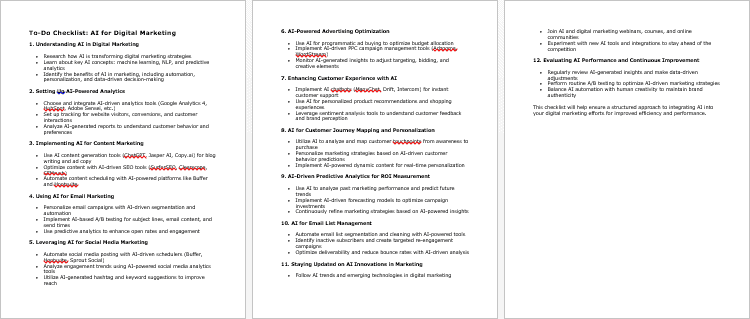
AI for Digital Marketing – FAQs

AI for Digital Marketing – Salespage Content

Package Details:
Word Count: 26 751 Words
Number of Pages: 117
AI for Digital Marketing – Bonus Content
Checklist
Word Count: 475 words
FAQs
Word Count: 1010 words
Salespage Content
Word Count: 647 words
Total Word Count: 28 883 Words
Your PLR License Terms
PERMISSIONS: What Can You Do With These Materials?
Sell the content basically as it is (with some minor tweaks to make it “yours”).
If you are going to claim copyright to anything created with this content, then you must substantially change at 75% of the content to distinguish yourself from other licensees.
Break up the content into small portions to sell as individual reports for $10-$20 each.
Bundle the content with other existing content to create larger products for $47-$97 each.
Setup your own membership site with the content and generate monthly residual payments!
Take the content and convert it into a multiple-week “eclass” that you charge $297-$497 to access!
Use the content to create a “physical” product that you sell for premium prices!
Convert it to audios, videos, membership site content and more.
Excerpt and / or edit portions of the content to give away for free as blog posts, reports, etc. to use as lead magnets, incentives and more!
Create your own original product from it, set it up at a site and “flip” the site for megabucks!
RESTRICTIONS: What Can’t You Do With These Materials?
To protect the value of these products, you may not pass on the rights to your customers. This means that your customers may not have PLR rights or reprint / resell rights passed on to them.
You may not pass on any kind of licensing (PLR, reprint / resell, etc.) to ANY offer created from ANY PORTION OF this content that would allow additional people to sell or give away any portion of the content contained in this package.
You may not offer 100% commission to affiliates selling your version / copy of this product. The maximum affiliate commission you may pay out for offers created that include parts of this content is 75%.
You are not permitted to give the complete materials away in their current state for free – they must be sold. They must be excerpted and / or edited to be given away, unless otherwise noted. Example: You ARE permitted to excerpt portions of content for blog posts, lead magnets, etc.
You may not add this content to any part of an existing customer order that would not require them to make an additional purchase. (IE You cannot add it to a package, membership site, etc. that customers have ALREADY paid for.)
Deprecated: Function post_permalink is deprecated since version 4.4.0! Use get_permalink() instead. in /home/buyqualityplr/public_html/wp-includes/functions.php on line 6121
Share Now!

